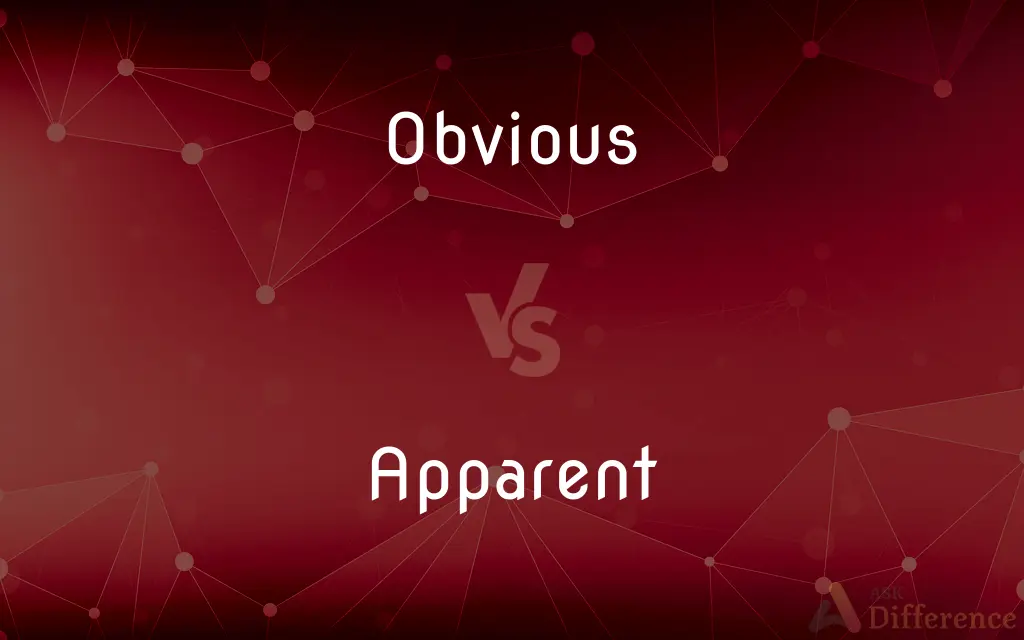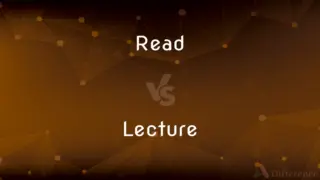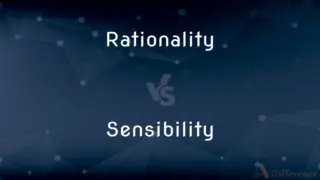Obvious vs. Apparent — What's the Difference?
Edited by Tayyaba Rehman — By Urooj Arif — Updated on March 11, 2024
"Obvious" refers to something easily perceived or understood, requiring no explanation, while "apparent" suggests something appears to be true based on visible clues, but may not be confirmed.

Difference Between Obvious and Apparent
Table of Contents
ADVERTISEMENT
Key Differences
Obvious implies a level of clarity or evidence that makes something immediately recognizable or understandable without need for further explanation or proof. It denotes a sense of certainty and leaves little to no room for doubt. On the other hand, apparent is used to describe something that seems to be true based on the evidence or appearances available, but this perception may not fully capture the whole truth or might require further verification.
The use of "obvious" often conveys a stronger conviction about the certainty of a statement or observation, suggesting that anyone should be able to see or understand the point being made. In contrast, "apparent" might be used in situations where there's an implication that something seems to be the case, but there might be underlying factors or additional information that could alter the perception.
In communication, labeling something as "obvious" can sometimes shut down further discussion or inquiry, as it implies that the matter is settled and not open to interpretation. Meanwhile, describing something as "apparent" can invite further discussion or investigation, acknowledging that while things seem a certain way, there may be more to understand or explore.
In some contexts, "apparent" can also imply visibility or manifestation, as in "the apparent symptoms of an illness," where the symptoms are observable and present, but this does not necessarily provide a complete understanding of the illness. "Obvious," however, is less likely to be used in this context, as it carries a connotation of something being self-evident beyond just visibility.
The distinction between "obvious" and "apparent" can also reflect the speaker's attitude towards the information being conveyed. Using "obvious" might indicate a perspective that assumes shared knowledge or understanding, while "apparent" might suggest a more cautious approach, acknowledging the observer's interpretation of the situation.
ADVERTISEMENT
Comparison Chart
Clarity
Clearly understood or recognized, no ambiguity
Seems to be true based on evidence, but may require further confirmation
Certainty
Implies a high level of certainty and definitiveness
Suggests a degree of uncertainty or the need for further investigation
Communication
Can imply that further discussion is unnecessary
Invites further inquiry or verification
Context
Used when something is self-evident
Used when something appears to be the case
Attitude
Reflects a stance of shared knowledge or understanding
Reflects a cautious or observant stance
Compare with Definitions
Obvious
Easily perceived or understood, leaving no doubt.
The solution was obvious to everyone in the room.
Apparent
Might require further verification or investigation.
His guilt was apparent, but further evidence was needed for a conviction.
Obvious
Not requiring explanation or evidence.
His disappointment was obvious from his facial expression.
Apparent
Appears to be true based on visible or superficial clues.
The apparent cause of the accident was a flat tire.
Obvious
Can indicate a lack of subtlety.
The theme of the story was made too obvious, leaving little to the imagination.
Apparent
Can suggest a surface-level understanding.
The benefits of the new policy are apparent but may overlook some deeper issues.
Obvious
Can imply common sense or general knowledge.
It's obvious that water freezes at 0°C.
Apparent
Reflects a perception that might change with new information.
The apparent simplicity of the task was misleading.
Obvious
Sometimes used to emphasize a point.
Obviously, we need to act quickly to solve the issue.
Apparent
Often used when describing symptoms or manifestations.
The patient showed apparent signs of recovery.
Obvious
Easily perceived or understood; clear, self-evident, or apparent
Unemployment has been the most obvious cost of the recession
It was obvious a storm was coming in
Apparent
Clearly visible or understood; obvious
It became apparent that he was talented
For no apparent reason she laughed
Obvious
Easily perceived or understood; apparent.
Apparent
Seeming real or true, but not necessarily so
His apparent lack of concern
Obvious
Easily seen through because of a lack of subtlety; transparent
An obvious political ploy that fooled no one.
Apparent
Readily seen; visible
The animal's markings were immediately apparent.
Obvious
Easily discovered, seen, or understood; self-explanatory.
Apparent
Readily understood; clear or obvious
The error was apparent to everyone in the audience.
Obvious
Opposing; fronting.
To the evil turnMy obvious breast.
Apparent
Appearing as such but not necessarily so; seeming
An apparent advantage.
Obvious
Exposed; subject; open; liable.
Apparent
Capable of being seen, or easily seen; open to view; visible to the eye, eyely; within sight or view.
Obvious
Easily discovered, seen, or understood; readily perceived by the eye or the intellect; plain; evident; apparent; as, an obvious meaning; an obvious remark.
Apart and easy to be known they lie,Amidst the heap, and obvious to the eye.
Apparent
Clear or manifest to the understanding; plain; evident; obvious; known; palpable; indubitable.
Obvious
Easily perceived or understood;
Obvious errors
Apparent
Appearing to the eye or mind (distinguished from, but not necessarily opposed to, true or real); seeming.
Obvious
Easily perceived by the senses or grasped by the mind;
A perceptible sense of expectation in the court
An obvious (or palpable) lie
Apparent
Capable of being seen, or easily seen; open to view; visible to the eye; within sight or view.
The moon . . . apparent queen.
Obvious
Obvious to the eye or mind;
A tower conspicuous at a great distance
Wore conspicuous neckties
Made herself conspicuous by her exhibitionistic preening
Apparent
Clear or manifest to the understanding; plain; evident; obvious; known; palpable; indubitable.
It is apparent foul play.
Obvious
Obvious to the eye;
A visible change of expression
Apparent
Appearing to the eye or mind (distinguished from, but not necessarily opposed to, true or real); seeming; as the apparent motion or diameter of the sun.
To live on terms of civility, and even of apparent friendship.
What Berkeley calls visible magnitude was by astronomers called apparent magnitude.
Apparent
An heir apparent.
I'll draw it [the sword] as apparent to the crown.
Apparent
Clearly apparent or obvious to the mind or senses;
The effects of the drought are apparent to anyone who sees the parched fields
Evident hostility
Manifest disapproval
Patent advantages
Made his meaning plain
It is plain that he is no reactionary
In plain view
Apparent
Appearing as such but not necessarily so;
For all his apparent wealth he had no money to pay the rent
The committee investigated some apparent discrepancies
The ostensible truth of their theories
His seeming honesty
Apparent
Readily apparent to the eye;
Angry for no apparent reason
Had no visible means of support
Common Curiosities
Can "apparent" and "obvious" be used interchangeably?
While sometimes used interchangeably in casual conversation, "apparent" suggests a degree of surface-level understanding or assumption, whereas "obvious" implies something is undeniably clear and certain.
What does it mean when something is described as "obvious"?
When something is described as "obvious," it means it is clearly understood or recognized by everyone, without need for further explanation.
What does "apparent" indicate in a scientific context?
In a scientific context, "apparent" can indicate observations or results that seem to support a hypothesis but require further investigation or confirmation.
How does the use of "obvious" affect communication?
Using "obvious" in communication can imply that a point is settled and not open for discussion, potentially discouraging further inquiry or debate.
Is "obvious" always a matter of common knowledge?
"Obvious" often implies common knowledge or understanding, but it can also refer to something that should be clear to someone with specific knowledge or in a particular context.
Does "apparent" imply a possibility of change upon further investigation?
Yes, "apparent" implies that an initial observation or conclusion might change upon further investigation or when more information becomes available.
How do "obvious" and "apparent" relate to perception and reality?
"Obvious" relates to what is undeniably clear in reality, requiring no interpretation, while "apparent" relates more to perception, which may or may not align with the full reality.
How does the context influence the choice between "obvious" and "apparent"?
The choice between "obvious" and "apparent" can depend on the degree of certainty, the need for further evidence, and the speaker's attitude towards the information being conveyed, with context guiding the most appropriate usage.
Why might someone choose to use "apparent" rather than "obvious"?
Someone might choose to use "apparent" to reflect a cautious approach, acknowledging that while something seems a certain way, there may be more to understand or verify.
Can something be apparent but not obvious?
Yes, something can be apparent, meaning it seems to be true based on available evidence, but not obvious if it requires interpretation or additional information to be fully understood.
Share Your Discovery

Previous Comparison
Read vs. Lecture
Next Comparison
Rationality vs. SensibilityAuthor Spotlight
Written by
Urooj ArifUrooj is a skilled content writer at Ask Difference, known for her exceptional ability to simplify complex topics into engaging and informative content. With a passion for research and a flair for clear, concise writing, she consistently delivers articles that resonate with our diverse audience.
Edited by
Tayyaba RehmanTayyaba Rehman is a distinguished writer, currently serving as a primary contributor to askdifference.com. As a researcher in semantics and etymology, Tayyaba's passion for the complexity of languages and their distinctions has found a perfect home on the platform. Tayyaba delves into the intricacies of language, distinguishing between commonly confused words and phrases, thereby providing clarity for readers worldwide.
















































